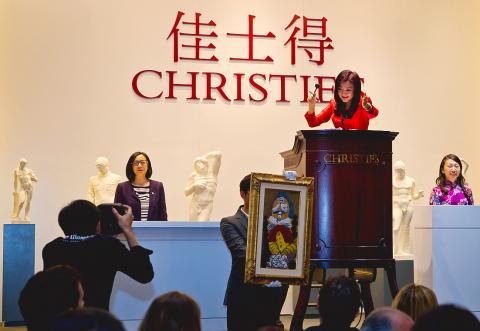Christie’s drew the elite of China closer into its orbit with an auction Thursday of works by Pablo Picasso, Andy Warhol and others in Shanghai, the first time any foreign auction house has held such a sale in China without having to go through intermediaries.
The London auction house put 42 pieces under the hammer, with bidding expected to raise around US$16 million.
Along with Pablo Picasso’s Homme Assis (1969), Andy Warhol’s Diamond Dust Shoes (1980-81), and a 1963 still-life by Giorgio Morandi, items include works of Asian contemporary art and fine wines in recognition of China’s booming market for rare vintages.

Photo: EPA
No Chinese works dating from before the fall of the Qing dynasty in 1911 will be offered however, in deference to Chinese regulations that seek to discourage looters and grave robbers.
China, the world’s second largest economy, already has more than a million millionaires, many of whom are seeking to diversify their investments away from gold and real estate. Chinese bidders are now common at overseas auctions. The number attending Christie’s events has doubled since 2008. Some US$4.6 billion worth of cultural relics and artworks were sold last year in the domestic auction market, according to China’s commerce ministry.
Christie’s has long operated in Hong Kong and has been organizing sales in China since 2005 by allowing a Chinese auction firm to use its international trademark.
The auction house said on April 9 it was granted a license to operate independently in China, making it the first international auction house to hold its own branded events there.
“I think it is one of the most important steps the company has taken in almost 250 years of history. It’s as important as arriving in America in the 1970s,’’ said Jonathan Stone, Christie’s chairman and international head of Asian art.
Relations between Beijing and Christie’s have been helped along by shrewd public relations work on behalf of the Pinault family, which owns the auction house’s parent company, Kering.
In June, the family donated a pair of Qing dynasty bronzes looted from a Beijing palace more than 150 years ago to China’s national museum. China had long sought the return of the heads, which had become a symbol of the country’s past humiliation by foreign powers, and the family won hearty plaudits from the government.
Stone said negotiations over the license were going on at the same time as the donation was discussed.
Prospective bidder Chen Huofa, a mining magnate from the eastern Chinese city of Hangzhou, said he had his eye on Morandi’s Natura Morta because of the impact the Italian painter had on modern Chinese artists.
“I am not interested in all the Western works, only in those who strongly influenced Chinese art,’’ said Chen, who is building a private museum.
Rebecca Catching, director of OV Gallery in Shanghai, said art bought at auction is a major status symbol for wealthy Chinese because everyone will know how much they paid for it.
“If their friends question their taste they can say, ‘Well, it was sold for two million at auction,’” Catching said.

June 9 to June 15 A photo of two men riding trendy high-wheel Penny-Farthing bicycles past a Qing Dynasty gate aptly captures the essence of Taipei in 1897 — a newly colonized city on the cusp of great change. The Japanese began making significant modifications to the cityscape in 1899, tearing down Qing-era structures, widening boulevards and installing Western-style infrastructure and buildings. The photographer, Minosuke Imamura, only spent a year in Taiwan as a cartographer for the governor-general’s office, but he left behind a treasure trove of 130 images showing life at the onset of Japanese rule, spanning July 1897 to

One of the most important gripes that Taiwanese have about the Democratic Progressive Party (DPP) is that it has failed to deliver concretely on higher wages, housing prices and other bread-and-butter issues. The parallel complaint is that the DPP cares only about glamor issues, such as removing markers of Chinese Nationalist Party (KMT) colonialism by renaming them, or what the KMT codes as “de-Sinification.” Once again, as a critical election looms, the DPP is presenting evidence for that charge. The KMT was quick to jump on the recent proposal of the Ministry of the Interior (MOI) to rename roads that symbolize

On the evening of June 1, Control Yuan Secretary-General Lee Chun-yi (李俊俋) apologized and resigned in disgrace. His crime was instructing his driver to use a Control Yuan vehicle to transport his dog to a pet grooming salon. The Control Yuan is the government branch that investigates, audits and impeaches government officials for, among other things, misuse of government funds, so his misuse of a government vehicle was highly inappropriate. If this story were told to anyone living in the golden era of swaggering gangsters, flashy nouveau riche businessmen, and corrupt “black gold” politics of the 1980s and 1990s, they would have laughed.

It was just before 6am on a sunny November morning and I could hardly contain my excitement as I arrived at the wharf where I would catch the boat to one of Penghu’s most difficult-to-access islands, a trip that had been on my list for nearly a decade. Little did I know, my dream would soon be crushed. Unsure about which boat was heading to Huayu (花嶼), I found someone who appeared to be a local and asked if this was the right place to wait. “Oh, the boat to Huayu’s been canceled today,” she told me. I couldn’t believe my ears. Surely,